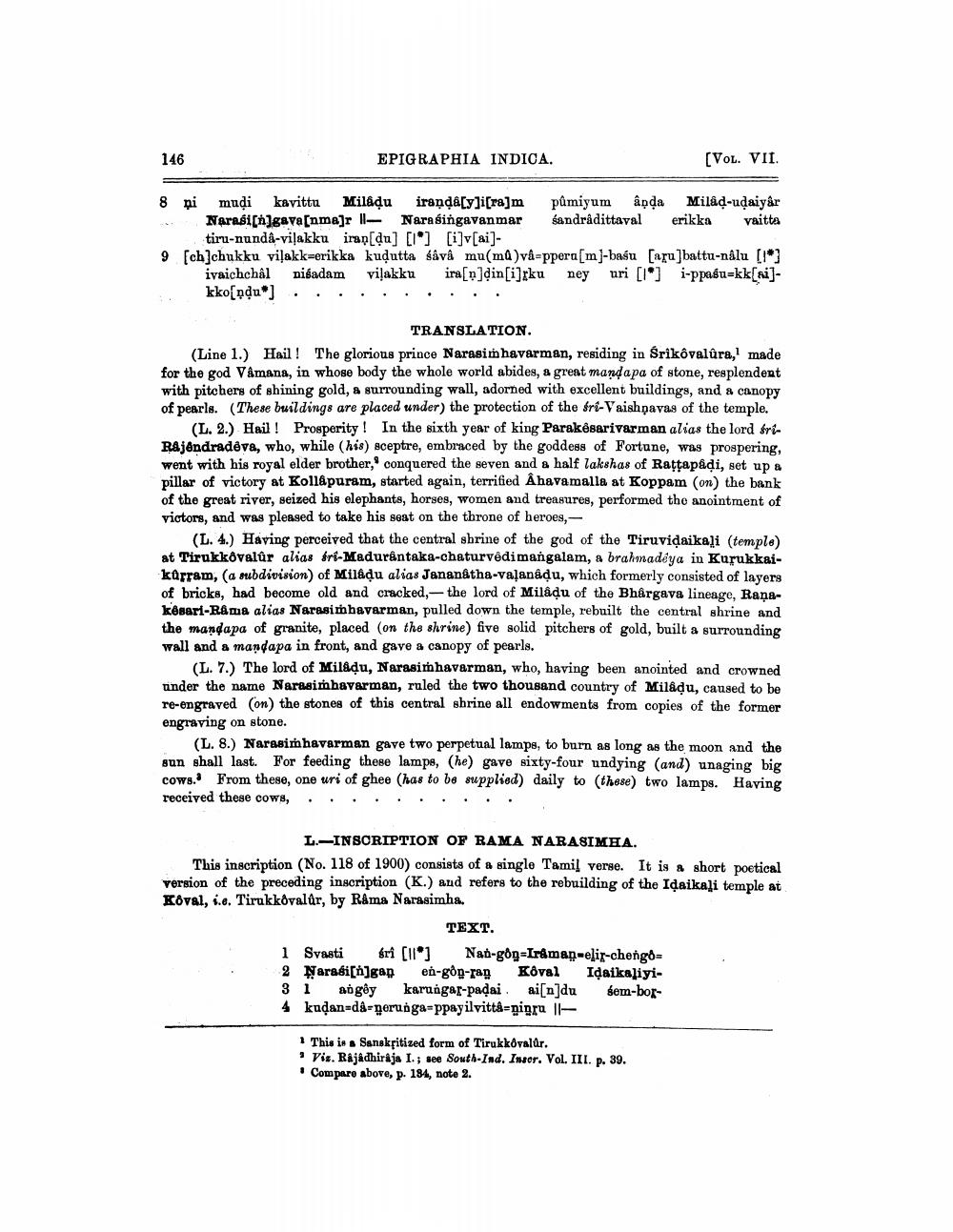________________
146
EPIGRAPHIA INDICA.
(VOL. VII.
8 pi mudi kavittu Miladu iranda[y]i[ra]m půmiyum âņda Milad-udaiyar
Narasi[n]gava[nma]r - Narasingavanmar sandrådittaval erikka vaitta
tiru-nunda-vilakku iran[du] [] [i]v[ai]9 [ch]chukku viļakk-erikka kudutta såvå mu(md) vâ=ppera[m]-basu [aru]battu-nálu (*)
ivaichchål niệadam viļakku ira[n]din[i][ku ney uri [1] i-ppafu=kk[si]kkondu®]. . . . . . . . .
i
TRANSLATION (Line 1.) Hail! The glorious prince Narasim havarman, residing in Srikovalûra, made for the god Vamana, in whose body the whole world abides, & great mandapa of stone, resplendent with pitchers of shining gold, a surrounding wall, adorned with excellent buildings, and a canopy of pearls. These buildings are placed under) the protection of the frf-Vaishnavas of the temple.
(L. 2.) Hail! Prosperity! In the sixth year of king Parakesarivarman alias the lord frtRajendradêve, who, while (his) sceptre, embraced by the goddess of Fortune, was prospering, went with his royal elder brother, conquered the seven and a half lakshas of Rattapadi, set up a pillar of victory at Kollapuram, started again, terrified Åhavamalla at Koppam (on) the bank of the great river, seized his elephants, horses, women and treasures, performed the anointment of victors, and was pleased to take his seat on the throne of heroes,
(L. 4.) Having perceived that the central shrine of the god of the Tiruvidaikali (temple) at Tirukkovalûr alias fri-Maduråntaka-chaturvedimangalam, a brahmaddya in Kurukkaikûrram, (a subdivision of Miladu alias Jananátha-vaļanadu, which formerly consisted of layers of bricks, had become old and cracked,- the lord of Miladu of the Bhargava lineage, Raņakesari-Rama alias Narasimhavarman, pulled down the temple, rebuilt the central shrine and the mandapa of granite, placed (on the shrine) five solid pitchers of gold, built a surrounding wall and a mandapa in front, and gave a canopy of pearls.
(L. 7.) The lord of Miladu, Narasimhavarman, who, having been anointed and crowned under the name Narasimhavarman, ruled the two thousand country of Miladu, caused to be re-engraved on the stones of this central shrine all endowments from copies of the former engraving on stone.
(L. 8.) Narasimhavarman gave two perpetual lamps, to burn as long as the moon and the gun shall last. For feeding these lampe, (he) gave sixty-four undying (and) unaging big cows. From these, one uri of ghee (has to be supplied) daily to (these) two lamps. Having received these cows, . . . . . . . . . .
L-INSCRIPTION OF RAMA NARASIMHA. This inscription (No. 118 of 1900) consists of a single Tamil verse. It is a short poetical version of the preceding inscription (K.) and refers to the rebuilding of the Idaikali temple at Koval, i.e. Tirukkovalûr, by R&ma Narasimha.
TEXT. 1 Svasti ri [11*) Nat-gðg-Iraman-elir-chengd= 2 Narasi[n]gan en-gop-ran Koval Idaikaliyi31 angøy karungar-padai ai[n]du sem-bor4 kudan-da-gerunga=ppayilvitta-pipru 11
1 This is a Sanskritized form of Tirukkovalar. · Vis. Rajadhiraja I.; see South-Ind. Insor. Vol. III. p. 39. • Compare above, p. 184, note 2.




